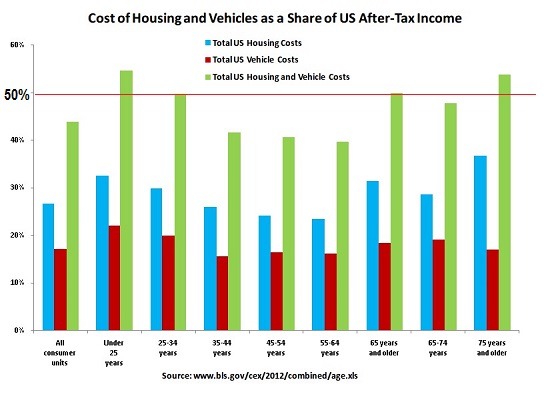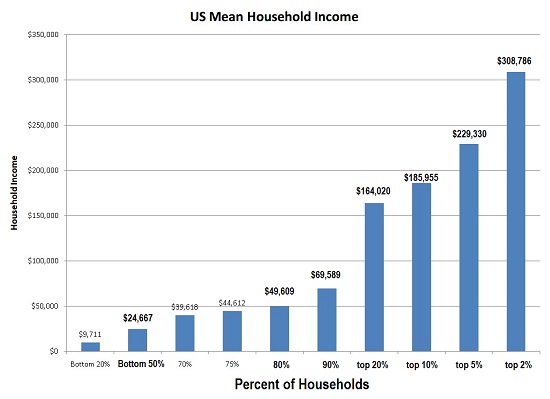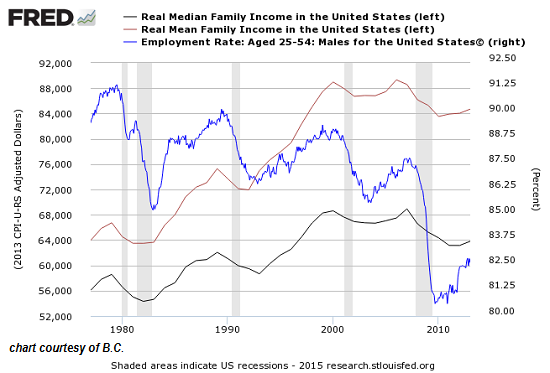U.S. Households Under Pressure: Stagnant Incomes, Rising Basic Expenses
How do you support a consumer economy with stagnant incomes for the bottom 90%, rising basic expenses and crashing employment for males ages 25-54? Answer: you don't.
Frequent contributor B.C. passed along a sobering set of charts that provide context for How The Average U.S. Consumer Spends Their Paycheck. The basic story is well-known to the bottom 90%: most of the household income goes to taxes, housing, food and transportation, with healthcare and insurance, pensions and retirement contributions rounding out the big-ticket items. (Higher education is, as we all know, paid with student loans by all but the top-tier of families.)

The concentration of earnings in the top 10% and 5% is clear: the bottom 50% of households earn a fraction of the top 10%, and the bottom 90% get by with less than a third of the income of the top 5%:

The recent decline in male employment in the peak earning years (ages 25-54) is striking: the employment rate for males ages 25-54 has been stairstepping down for 30 years, but it literally fell off a cliff in 2009:

How do you support a consumer economy with stagnant incomes for the bottom 90%, rising basic expenses and crashing employment for males ages 25-54? Answer: you don't. The media shills, government lackeys and PR-pimps can spin the GDP and other gamed statistics as much as they want, but no amount of statistical gaming will change the stagnation that results from generational declines in employment, flat wages and rising basic household expenses.
Get a Job, Build a Real Career and Defy a Bewildering Economy(Kindle, $9.95)(print, $20)
 Are you like me? Ever since my first summer job decades ago, I've been chasing financial security. Not win-the-lottery, Bill Gates riches (although it would be nice!), but simply a feeling of financial control. I want my financial worries to if not disappear at least be manageable and comprehensible.
Are you like me? Ever since my first summer job decades ago, I've been chasing financial security. Not win-the-lottery, Bill Gates riches (although it would be nice!), but simply a feeling of financial control. I want my financial worries to if not disappear at least be manageable and comprehensible. And like most of you, the way I've moved toward my goal has always hinged not just on having a job but a career.
You don't have to be a financial blogger to know that "having a job" and "having a career" do not mean the same thing today as they did when I first started swinging a hammer for a paycheck.
Even the basic concept "getting a job" has changed so radically that jobs--getting and keeping them, and the perceived lack of them--is the number one financial topic among friends, family and for that matter, complete strangers.
So I sat down and wrote this book: Get a Job, Build a Real Career and Defy a Bewildering Economy.
It details everything I've verified about employment and the economy, and lays out an action plan to get you employed.
I am proud of this book. It is the culmination of both my practical work experiences and my financial analysis, and it is a useful, practical, and clarifying read.
Test drive the first section and see for yourself. Kindle, $9.95 print, $20
"I want to thank you for creating your book Get a Job, Build a Real Career and Defy a Bewildering Economy. It is rare to find a person with a mind like yours, who can take a holistic systems view of things without being captured by specific perspectives or agendas. Your contribution to humanity is much appreciated."
Laura Y.
Gordon Long and I discuss The New Nature of Work: Jobs, Occupations & Careers(25 minutes, YouTube)
The Old Models of Work Are Broken
NOTE: Contributions/subscriptions are acknowledged in the order received. Your name and email remain confidential and will not be given to any other individual, company or agency.
| Thank you, anonymous from Seattle ($200), for your beyond-outrageously generous contribution to this site-- I am greatly honored by your steadfast support and readership. |



























